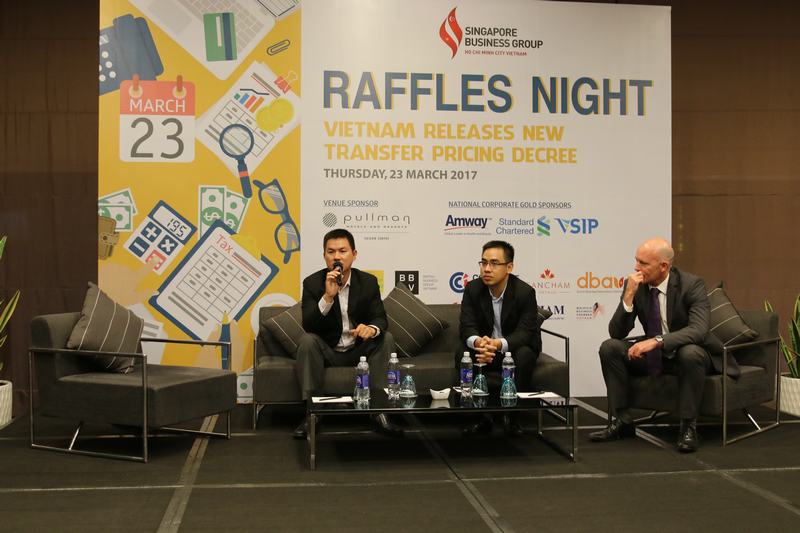RAFFLES NIGHT – VIETNAM RELEASES NEW TRANSFER PRICING DECREE

Vietnam’s Transfer Pricing Revamp Redefines Related Parties
New rules in Vietnam will mark the biggest overhaul to transfer pricing in a decade, analysts say, as the country embraces global measures to curb tax avoidance.
The upcoming Decree 20 redefines companies’ relationships to others with which they do business, describes transfer pricing strategies used to reduce taxes and gathers data through global tax and profit, or country by-country, reports detailing companies’ earnings and taxes paid in each country
of operation. With these reports, Vietnam counts itself among nations enacting recommendations from the Organization for Economic Cooperation and Development to prevent tax base erosion and profit shifting.
Decree 20 takes effect May 1 as inspectors in Vietnam’s General Department of Taxation prepare to fan out. EY partner Phat Tan Nguyen said transfer pricing audits used to target electronics, textile and garment companies, “but now they expand to cover all industries.”
His colleague Robert King, EY tax partner for Vietnam, Cambodia and Laos, said global tax agencies estimate they’re losing between $100 billion and $240 billion a year because of transfer pricing abuses.
Other provisions in Decree 20 include a cap on loan interest deductions at 20 percent of earnings, as well as details on how one division of a business should charge another division for goods and services. To prove they aren’t manipulating internal fees to shift profits to tax havens, corporations are supposed to use market prices, or comparables, as benchmarks. But when the tax agency
conducts investigations, it doesn’t always disclose how it compares prices.
Secret Comparables
“I think the most controversial” issue “is auditors use the secret comparables,” Nguyen, who specializes in transfer pricing, said March 23 at a seminar hosted by the Singapore Business Group in Ho Chi Minh City.
“That is the most challenging and the most tricky for the taxpayers in Vietnam right now.”
The new decree lets transfer pricing auditors use secret databases when companies don’t properly document their fee calculations.
“This type of development clearly could give rise to increasingly lengthy disputes,” PwC Vietnam said in a tax brief.
Vietnam hasn’t signed the OECD’s Multilateral Competent Authority Agreement for governments to exchange country-by-country reports. But it’s requiring multinationals to submit those files if their parent company is in a jurisdiction that requires the reports, or if the parent is in Vietnam and makes 18 trillion Vietnamese dong ($790 million) or more annually.
These reports break down corporations’ data in each country, such as revenue, taxes, registered capital, and staff. They’re one part of the “three-tier” taxpayer filings now required by many governments and included in Decree 20. The two others are a master document with uniform criteria about a company’s global profile and a local document of its activities in Vietnam.
‘Related Party’ Definition, Services The government decree eased the definition of related parties somewhat, but imposed new restrictions on when companies can deduct related-party service charges.
The decree updates the definition of “related party” to cover businesses with 25 percent common ownership (previously 20 percent). They’re also related if one firm gives loans to another worth 25 percent of equity (up from 20 percent). Under Decree 20, Vietnam will no longer consider two parties related just because one company makes at least half its sales to the other.
“Decree 20 introduces another requirement that in order for expenses for intercompany services to be deductible, the economic benefit of the expense and the reasonableness of the pricing mechanism need to be justified,” Domicile Corporate Services, an accounting services firm based in Ho Chi Minh City, said in a tax alert.
In other words, regulators are reinforcing the arm’s-length principle that businesses can write off expenses at costs they’d be willing to pay third parties.
Exemptions
Taxpayers are exempt from submitting transfer pricing reports, which are separate from the three-tier files, if they have advance pricing agreements with the government or annual revenue below 50 billion dong. That threshold is 200 billion dong for companies with simpler business functions that don’t profit from intangibles.
Nguyen said a future circular will define those functions, based on a draft he had seen.
But these exemptions could put firms in a pickle, King said. If they don’t file annual transfer pricing reports with the tax department, how will they show compliance with the arm’s-length principle in the case of an audit?
“It’s a little unclear how it’s going to work when you go through an audit cycle,” King said at the seminar.
Violators can be fined up to 20 percent of the shortfall if they underpay taxes, and up to three times the taxes due in cases of evasion.
Source: Transfer Pricing Report: News Archive > 2017 > Latest Developments > Asia/Pacific Rim > Vietnam:
Vietnam’s Transfer Pricing Revamp Redefines Related Parties
To contact the reporter on this story: Lien Hoang in Ho Chi Minh City at correspondents@bna.com
To contact the editor responsible for this story: Molly Moses at mmoses@bna.com

